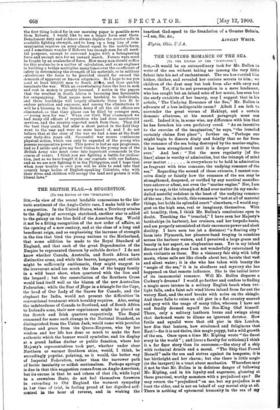THE BRITISH FLAG.—A SUGGESTION.
[TO THE EDITOR OP THE "SPECTATOR.1 SIR,—In view of the recent laudable concessions to the his- toric sentiment of the Anglo-Celtic race, I make bold to offer a suggestion. In the United States, when a Territory attains to the dignity of sovereign statehood, another star is added to the galaxy on the blue field of the American flag. Would it not be a fitting recognition of the new order of affairs, at the opening of a new century, and at the close of a long and beneficent reign, and as emphasising the increase of strength in the ties that bind the young nations to the Motherland, that some addition be made to the Royal Standard of England, and that each of the great Dependencies of the Empire be represented thereon by suitable device ? I do not know whether Canada, Australia, and South Africa have distinctive arms, and while the beaver, kangaroo, and ostrich might be sufficiently emblematic, they might suggest to the irreverent mind too much the idea of the happy family in a wild beast show, when quartered with the lion and the leopard ; but the constellation of the Southern Cross would lend itself well as the blazon of the new Australian Federation; while the Star of dope in a triangle for the Cape, the bead of Our Lady of the Snows for Canada, and the elephant for India, would not present the difficulties' in conventional treatment which heraldry requires. Also, seeing the indebtedness of Canada to Scotland, and of South Africa to Ireland's sons, their new cognizances might be placed on the Scotch and Irish quarters respectively. The Royal command for some such change in the National Standard, as
distinguished from the Union Jack, would come with peculiar
fitness and grace from the Queen-Empress, who by her wisdom and her life has done so much to make the fact authentic which the banner would symbolise, and its display at a grand Indian durbar or public function, where her Majesty's representatives took part, whether under clear Northern or warmer Southern skies, would, I think, be exceedingly popular, pointing, as it would, the better way of Imperial Federation, rather than the narrower path of feeble insularity or selfish sectionalism. Perhaps apology is due in that this suggestion comes from an Anglo-American, but its excuse is that he and others of that ilk, while loyal to a crowuless State, do not feel themselves forsworn in extending to Old England the warmest sympathy in ler time of trial, in feeling proud of her dignified self- control in the hour of reverse, and in wishing the
heartiest God-speed to the foundation of a Greater Britain, —I am, Sir, ece., Elyria, Ohio, U.S.A.
AINSLEY WHITE.






































 Previous page
Previous page